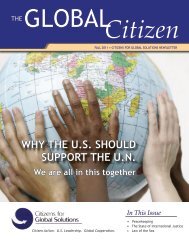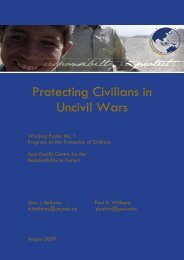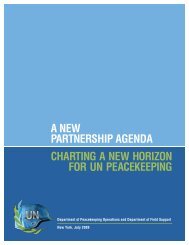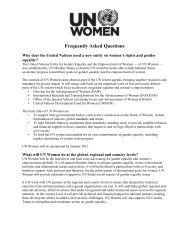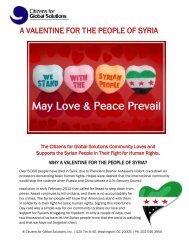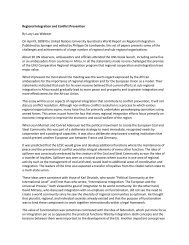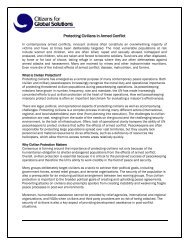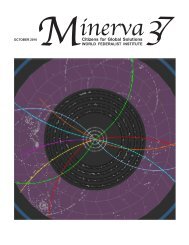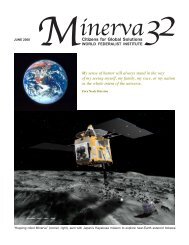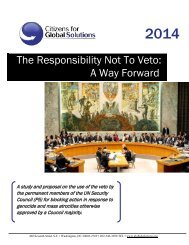Minerva, Fall 2011 - Citizens for Global Solutions
Minerva, Fall 2011 - Citizens for Global Solutions
Minerva, Fall 2011 - Citizens for Global Solutions
- No tags were found...
Create successful ePaper yourself
Turn your PDF publications into a flip-book with our unique Google optimized e-Paper software.
Assertive Action To Protect —Without WarLucy Law WebsterLucy Law Webster is a retired UN PoliticalAffairs Officer who is an officer ofthe international World Federalist Movementand of Economists <strong>for</strong> Peace andSecurity. She is also Executive Directorof the Center <strong>for</strong> War/Peace Studies.There is no easy way to protect human rights in clique-owned nations to prevent the deliberatekilling of civilians who want change. Nonetheless when transition councils (asin Libya) ask <strong>for</strong> help, it is right that the UN Security Council and other internationalcooperative bodies (like the Arab League) give a green light <strong>for</strong> protective action.It is important to note that the real cry <strong>for</strong> help by people facing death and displacementimposed by internal security <strong>for</strong>ces as in Syria, or by an autocratic regime opposed byinsurgents as in Libya, is totally different from the ef<strong>for</strong>t of émigrés from Iraq to getthe United States to invade their country. Urgent requests <strong>for</strong> help from people on theground are serious cries to protect life; some other reasons given <strong>for</strong> action such asthose that preceded the U.S. invasion of Iraq are mainly just excuses <strong>for</strong> war.Our aim should be to avoid war and to empower the international community to helpto protect people whose most basic human rights to life and security are deliberatelyviolated by rulers who use the police power of the state to protect themselves whilekilling and violating other citizens.While there is no simple <strong>for</strong>mula <strong>for</strong> assertive action to protect that would not involvepotentially-escalating violence with some measure of collateral damage, there are waysto maximize protection while minimizing violence:1. Civil society groups such as <strong>Citizens</strong> <strong>for</strong> <strong>Global</strong> <strong>Solutions</strong> have asked UN SecurityCouncil permanent members to take “Responsibility Not to Veto”. Similarly, PresidentNicolas Sarkozy recently asked President Vladimir Putin to refrain from using Russia’sveto to block a UN resolution criticizing Syria.2. Non-NATO nations, as well as those in NATO, should make maximum use of thelegal opportunities to deploy UN Standby Peacekeeping <strong>for</strong>ces to protect civilians inareas of danger be<strong>for</strong>e potential slaughter occurs.3. Regional groups such as ASEAN, the Gulf Cooperation Council, the African Unionand the European Union should explore ways to act in concert with each other andwithin the UN Charter rules to protect citizens against war and violence.4. To enhance the credibility of the Responsibility to Protect norm, all countries shouldrefrain from using it as an excuse <strong>for</strong> military action that is not held to the minimumlevel of violence and destruction possible. In discussing Syria with President Sarkozy,President Putin recently pointed out that the war in Iraq had not served the interests ofmost Iraqis. It definitely did not help to advance the R2P norm.5. Monitoring who is responsible <strong>for</strong> killing civilians (<strong>for</strong> example in Côte d’Ivoire orSyria) mainly provides data <strong>for</strong> post-conflict justice. It also helps to establish accountabilityto ICC norms that will deter future killing. Thus it is of value, but not as importantas diplomatic and peace <strong>for</strong>ce action to prevent war and internal conflict.6. In the longer run, the UN needs a relatively small directly recruited UN EmergencyPeace Service that can put highly trained UN security <strong>for</strong>ces on the ground, who willrisk their own safety <strong>for</strong> the protection of civilians.7. Also in the longer run, the UN Security Council should replace the veto power of thevictors in WWII with a system of weighted voting that represents all regions and allnations in an equitable manner.ï44 • <strong>Minerva</strong> #39 • November <strong>2011</strong>



